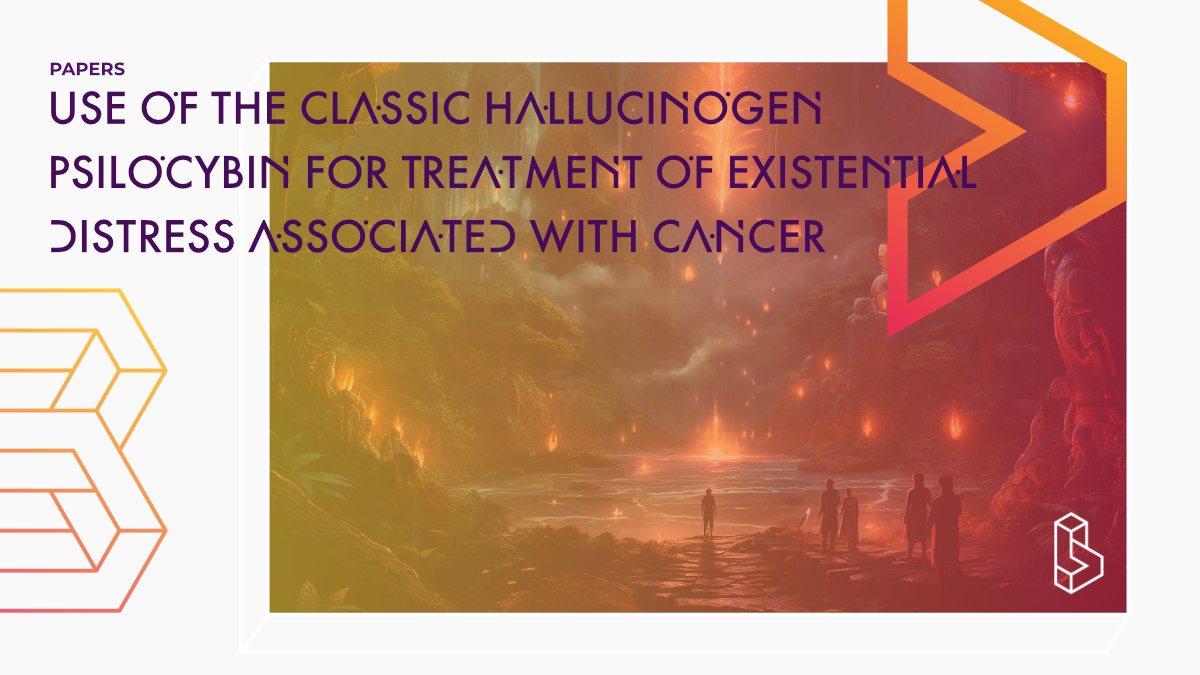This book chapter (2013) looks at the state of the research on psychedelics about cancer. The latter often leads to anxiety and a search for meaning. The former can help with this challenging journey.
Research after the writing of the book chapter supports the positive preliminary responses reported (e.g. Rapid and sustained symptom reduction following psilocybin treatment for anxiety and depression in patients with life-threatening cancer: A randomized controlled trial)
Authors: Charles Grob, Anthony Bossis & Roland R. Griffiths
Notes on Use of the Classic Hallucinogen Psilocybin for Treatment of Existential Distress Associated with Cancer
This chapter (17) comes from ‘Psychological Aspects of Cancer’.
“While published reports of therapeutic breakthroughs with difficult to treat and refractory patient populations were initially met with mainstream professional enthusiasm, by the late 1960s and early 1970s the growing association of hallucinogens with widespread indiscriminate use led to the temporary abandonment of this promising psychiatric treatment model.”
The chapter outlines the two different approaches taken in the 1950-1960’s, one in which a low dose was administrated (e.g. in psychotherapy) and the second in which a high dose was administrated (e.g. for breaking the cycle in alcoholism).
“One patient population that demonstrated positive response to the hallucinogen treatment model were individuals with advanced cancer with overwhelming anxiety in reaction to their terminal illness. … a growing consensus within the field of hallucinogen investigations was achieved that patients with advanced-stage cancer treated with this novel approach frequently sustained signifi cant improvements of their psychospiritual status.”
There are very good reasons for pursuing psychedelics research with cancer patients. “The prevalence of psychiatric disorders in cancer patients has been reported at approximately 50% with the presence of any depressive or anxiety disorder at 24%. The prevalence of major depression has been reported at 15% with a range of all depressive disorders in cancer patients at 20-26%. Anxiety spectrum disorders have been documented at 14% with the prevalence of any anxiety symptoms at 21%.”
On the distinction between religion and spirituality, the authors state that the latter is more encompassing: “Religion has been defined as structured belief systems that address universal questions and may provide a framework for making sense of ultimate questions of meaning and for expressing spirituality. Spirituality tends to be a broader, more inclusive category than religion. It can be de fi ned as “that which allows a person to experience transcendent meaning in life”.”
This then links to: “Meaning-enhancing interventions have been demonstrated to improve quality of life in palliative care and decrease wishes for euthanasia and for hastened death.”
And psychedelics can be the way to do this: “The hallucinogen treatment model, which has been shown to generate a mystical or spiritual experience, offers a highly unique and novel therapeutic approach to promote transcendence, meaning, and reduction in anxiety for terminal cancer patients. It is the only approach with the dying of its kind in medicine, psychiatry, and the behavioral sciences.”
“For many cancer patients, the mystical experience of consciousness provides a profound ontological shift. This ontological or paradigm shift in awareness has the capability to alter and transform a cancer patient’s assumptions and beliefs regarding the nature of being, the self, the body, disease, and death itself. Often, for the patient who has had this awareness, the body and cancer are experienced as separate (i.e., “I am not my cancer”).”
Summary of Use of the Classic Hallucinogen Psilocybin for Treatment of Existential Distress Associated with Cancer
A treatment model using psilocybin, a novel psychoactive drug, to ameliorate the psychospiritual distress and demoralization that often accompanies a life-threatening cancer diagnosis has been resuming after a hiatus lasting several decades.
Psilocybin
Psilocybin is a naturally occurring compound that is an active constituent of many species of mushrooms. It was originally used by indigenous people in Mexico and Central America, but was harshly condemned and punished by the Spanish Inquisition.
Find this paper
https://doi.org/10.1007/978-1-4614-4866-2_17
Open Access | Google Scholar | Backup | 🕊
Cite this paper (APA)
Grob, C. S., Bossis, A. P., & Griffiths, R. R. (2022). Use of the classic hallucinogen psilocybin for treatment of existential distress associated with cancer. Psychological aspects of cancer: A guide to emotional and psychological consequences of cancer, their causes, and their management, 69-89.
Study details
Compounds studied
Psilocybin
Topics studied
Anxiety
Palliative Care
Study characteristics
Literature Review
Book Chapter
Authors
Authors associated with this publication with profiles on Blossom
Charles GrobCharles Grob is a Professor of Psychiatry & Biobehavioral Sciences and Pediatrics at UCLA. His work with MDMA was the first FDA approved Phase 1 study. He co-founded the Heffter Research Institute and is also affiliated with the Lundquist Institute for Biomedical Innovation.
Roland Griffiths
Roland R. Griffiths is one of the strongest voices in psychedelics research. With over 400 journal articles under his belt and as one of the first researchers in the psychedelics renaissance, he has been a vital part of the research community.
